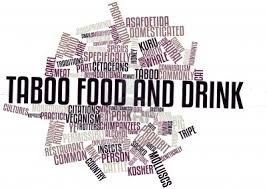 Food taboos and sensitivities vary around the world and should be respected. If a person realizes after the fact that he or she has eaten a taboo food (e.g., soup with bacon bits or beef stock), they may become depressed with guilt or feel physically ill. While it is a challenge to be sensitive to every food preference or restriction, vegetarian-based foods are the safest. Food taboos usually center around meat-based dishes.
Food taboos and sensitivities vary around the world and should be respected. If a person realizes after the fact that he or she has eaten a taboo food (e.g., soup with bacon bits or beef stock), they may become depressed with guilt or feel physically ill. While it is a challenge to be sensitive to every food preference or restriction, vegetarian-based foods are the safest. Food taboos usually center around meat-based dishes.
Most cultures view the dining experience as a time-honored ritual for enjoying carefully prepared food and bonding relationships. It is a ritual that can involve forbidden foods, dietary customs, and sometimes self-imposed restrictions. When planning meal-related functions, pay as much attention as possible to your guest’s dietary preferences. Do not assume that all cultures are the same. Scriptural guidelines (e.g., the Jewish Bible and the Quran) provide the religious bases for “time-honored” restrictions as they relate to Hindu, Muslim, or Orthodox Jewish customs.
There will be times when the menu is confusing or special foods cannot be arranged because the meals are predetermined (e.g., buffets). In that case, take the time to explain the buffet or menu and steer your guest to foods that will be suitable, for example:
A large manufacturing company was concerned about an engineer they hired from China. Every time he would join them for lunch when entertaining a client, he would order a recommended selection; however, he would not eat. This made everyone uncomfortable, especially their client. Realizing there might be a menu interpretation problem, they arranged for a private consulting session (with me) at the favorite restaurant of the client. And with the assistance of the maitre d’, we discovered the problem.
As it turns out, the engineer did not understand the menu, and he was afraid of ordering something with a dairy product ingredient. Many Chinese people are not accustomed to eating dairy products (especially cheese). When the engineer finally learned how to interpret the menu, he discovered a fish with a texture and taste that he was more accustomed to eating, and he learned to identify and avoid cheese-based menu items. He also learned the “option of substitutions.” At their next luncheon, he ordered fish with rice and tea and enjoyed his food. Everyone was comfortable at last. More importantly, the engineer ordered confidently and was enjoying his meal!
If you have a food-related restriction, I highly recommend that you familiarize yourself with the menu beforehand. Do not let this become an issue during an interview or a business meeting. You should place your order confidently and order what you know you will eat. It is important to eat! If you do not eat, you will make your dining partners uncomfortable. In the case that a special dish cannot be prepared, arrive early or call beforehand to inquire about the selection and the ingredients so that you may make your selection wisely.
Some individuals practice self-imposed dietary restrictions related to losing weight, personal comfort levels, or a preference for kosher or organic foods. Medical-related dietary restrictions due to allergies or diabetes require special preparation or the avoidance of certain foods. Additionally, alcoholic beverages are avoided by Muslims, Hindus, Mormons, and some Protestant sects.
And it does not stop here. Not all foods match the cuisine of other cultures. Foods that are common in one culture can be considered repulsive or odd in another culture. For example, corn on the cob is a picnic favorite in America; however, it is considered only suitable for animals in some cultures. Even the texture of a marshmallow can be repulsive. When receiving international visitors or traveling abroad, go over the menu beforehand to be sure no one’s comfort level is going to be challenged.
Trying to learn or to be sensitive to all the various restrictions can be mind-boggling. Spend time getting to know your client(s) and their preferences. Whatever the reason for a food restriction, it should be respected. This is an important step toward establishing a favorable relationship and achieving a successful business venture.
Want to learn more?
Read Chapter 5, “Food and Its Many Customs and Restrictions” in The Art of Professional Connections: Dining Strategies for Building and Sustaining Business Relationships.
Revisit guest columnist Peter Faur and his earlier article, “Traveling Abroad? Eat Whatever They Put in Front of You!”
Ask about our Global Dining Etiquette Seminars


